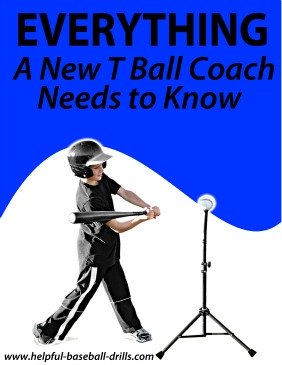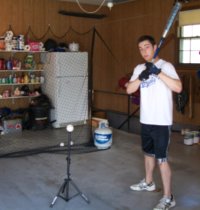Youth Baseball Instruction – the Good and the Bad Will Stick for Years

Our whole website is about
youth baseball instruction, so when you are finished with this article, please
have a look around. I believe we have most of the baseball coaching subjects
covered.
In this article I want to
talk about a conversation my 19 year old son and I had. I feel it has a lot of
important points for youth baseball coaches.
Brian, who is a freshman on
a college baseball team, was home for a rare open weekend this spring. We went
to watch a friend of ours coach his 14 year old son.
“Playing Scared”
During the game, the
shortstop on this team had made a couple of great defensive plays. But late in
the game, with the score tied, he let a ground ball go right thru his legs. You
could plainly see he was “playing scared”.
And, of course, one of the
coaches yelled out “You’ve got to make those plays!” He’s not the first coach
to say that, nor will he be the last. But I doubt if it did any good at that
moment in time.
On the way home Brian and I
both mentioned that the shortstop was very nervous, “playing scared”, on that
play.
And Brian commented that all
players lucky enough to play in college are past any “playing scared” problems.
If you reach the college level, you have played enough baseball to trust your
skills. You may not perform well, but it is not because you fear your coach or
dad yelling at you.
At 14 you still might have that problem. Things are going great, then when the game tightens up and the pressure is on, the nerves kick in. If you don’t see the nervousness on the play, then their reaction right after the play is a dead give away. They will be kicking the dirt or pounding their fist into their glove, rather than turning around and helping with the cutoff throw.
When Does It Start?
Where does this pressure
come from? Is the coach an overbearing type guy? Does the dad’s yelling still
upset the player? Or is it self brought on?
A few weeks before Brian and
I went to this game, I watched my grandson’s 8 year old machine pitch team play
a game. The team is playing well together, and they have a shot at winning
their league. They worked on youth baseball instruction during the winter, so expectations were high.
The team they were playing
was near the bottom in the league standings, so my grandson’s team expected to
win.
As we all know, so much for assumptions. The game was close and both teams were having trouble scoring.
Not Youth Baseball Instruction

My grandson’s team was in
the field late in the game and the go ahead run was on third base. There were
two outs and a low popup is hit to the pitcher. The pitcher settles under the
popup and just as he about to catch the ball, the shortstop comes running in
and bumps into the pitcher.
The pitcher hung onto the
baseball and the inning was over. But the coach, who was noticeably upset the
whole game, came unglued and starting yelling at the shortstop. And I mean
yelling loud.
Well, the 8 year old
shortstop immediately starts sobbing hard. Another coach had to take him into the
dugout and settle him down.
Later, after my grandson’s
team wins the game, the head coach apologizes to the shortstop and tells him he
was sorry for yelling at him. But the damage had been done.
No doubt the next time that
a game is on the line the shortstop is going to think twice before he makes an
aggressive move to the ball. This is where “playing scared” starts.
If you have been around little league baseball much at all, especially competitive baseball, you have probably seen a young player cry after a strikeout or error. They don’t behave that way on their own.
Somewhere along
the line a coach or one of their parents has said or yelled something that
created this monster. They yelled a lot more than youth baseball instruction.
Brian and I both believe
that “playing scared” starts at an age of 10 or under. And every player is
different, so with some it doesn’t take too much to develop this attitude.
It is sad but I’ve even
heard a coach yell out something that was not youth baseball instruction like,
meaning he yelled something mean not constructive. And then the next inning or
two he is telling a batter to “relax, and have some fun up there”.
Have you ever heard those
words? It’s probably came from someone who has caused the player to tense up in
the first place.
So, if you are a youth coach, please stop and think about this. Your actions not only affect your players this season, but even many seasons down the road.
Here is a listing of the drills under the Team Drills Section:
Team Drills:
- Game like Practice
- Team Workup Drill
- Relay Throws
- Team Throwing Drills
- The Workup Defensive Drills
- Fielder’s Communication Drill
- Indoor Baseball Drills
- Game of Pepper and Game of 2 Ball Toss
- Game of Flip and Game of 500
- The Doubles Game
Infield Drills:
- Infield Instruction
- Live Infield Action – My Favorite Infield Drill
- Teach Fielding Groundballs the Right Way
- Infield Throwing and Double Play Drills
- The Hot Box Drill
- Indoor Baseball Drills
- Fielder’s Communication Drill
- Relay Throws
- The Workup Defensive Drills
Outfield Drills:
- Outfield Instructions
- Outfield Drop Step Drill
- Game like Situations
- Fielder’s Communication Drill
- Relay Throws
- The Workup Defensive Drills
Coaching Tips and Misc Drills
- Coaching Baseball Tips
- Coaching Youth Baseball - Should I
- Coaching Little League Baseball
- Base Running Drills
- Baseball Coaching is Right For You
- Baseball Coaching Tips - Intimidating Coach
- Throwing with Accuracy and Power
- Baseball For Kids
- Youth Baseball Instruction - Playing Scared
- Youth Baseball Coaching – What's Your First Priority?

And if you don't find what you want, let us know. Drop us a line in the "Contact Box" and we will do everything we can to help you.
Do You Want To Hit At Home?
Subscribe to "Extra Innings" our every few weeks newsletter loaded with baseball drills, ideas and stories.
Looking For the Best Wood Bats at the Lowest Prices?




New! Comments
Have your say about what you just read! Leave me a comment in the box below.